Unit 1 Can you paly the guitar Period 4 Section B(2a-2c)课件(共49张PPT)
文档属性
| 名称 | Unit 1 Can you paly the guitar Period 4 Section B(2a-2c)课件(共49张PPT) | 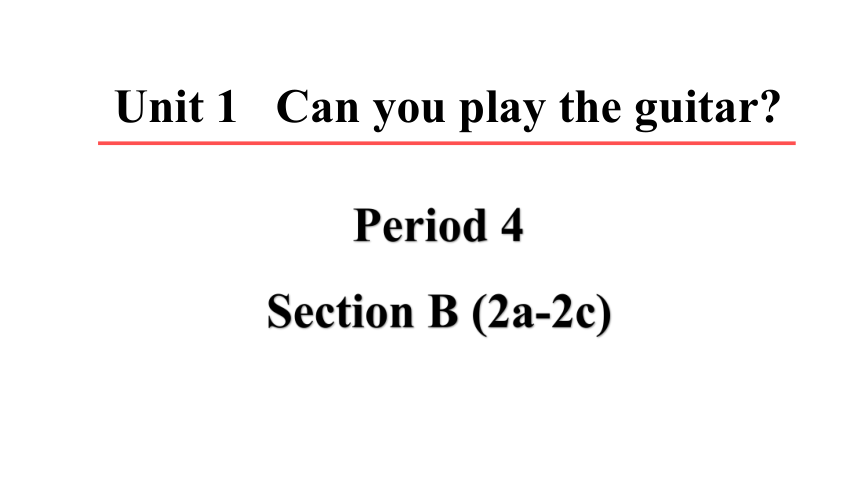 | |
| 格式 | pptx | ||
| 文件大小 | 16.3MB | ||
| 资源类型 | 教案 | ||
| 版本资源 | 人教新目标(Go for it)版 | ||
| 科目 | 英语 | ||
| 更新时间 | 2023-12-18 09:39:05 | ||
图片预览


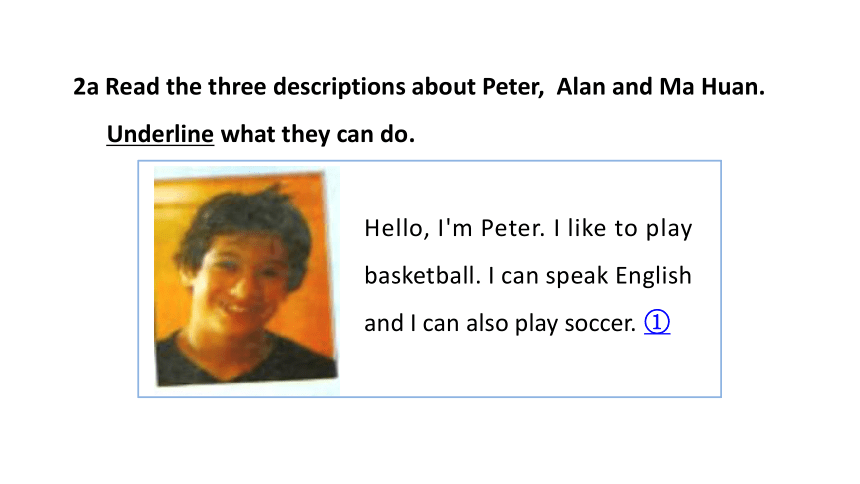
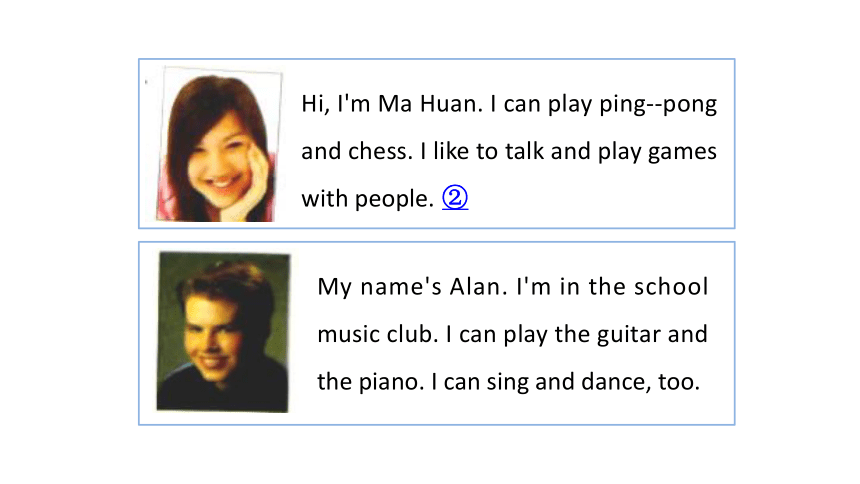
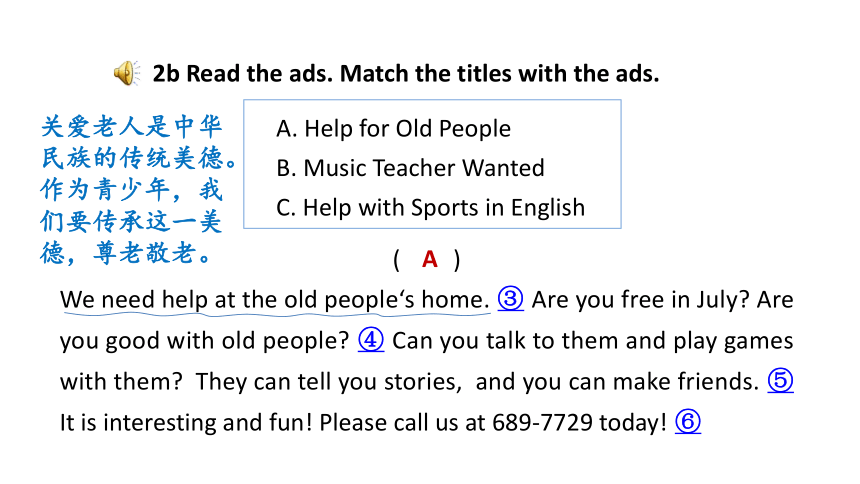
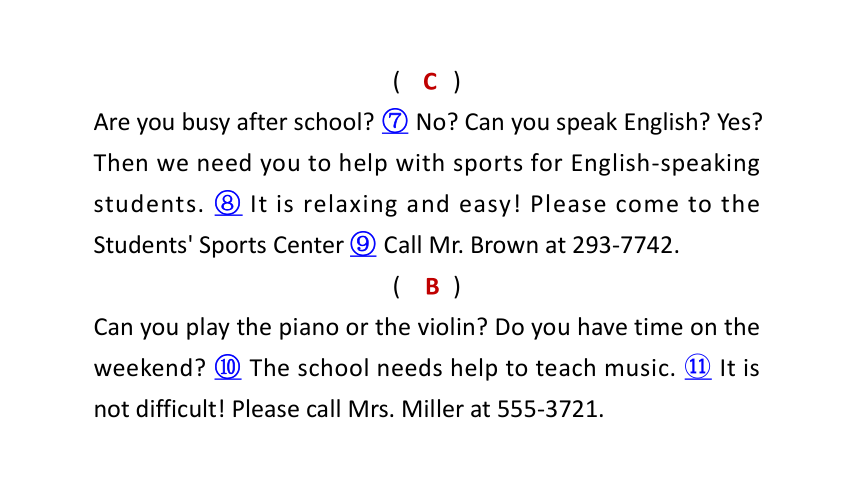
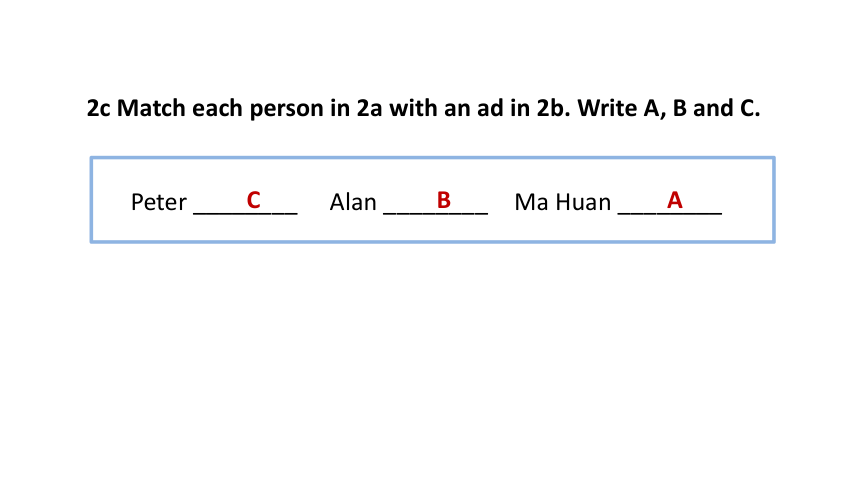
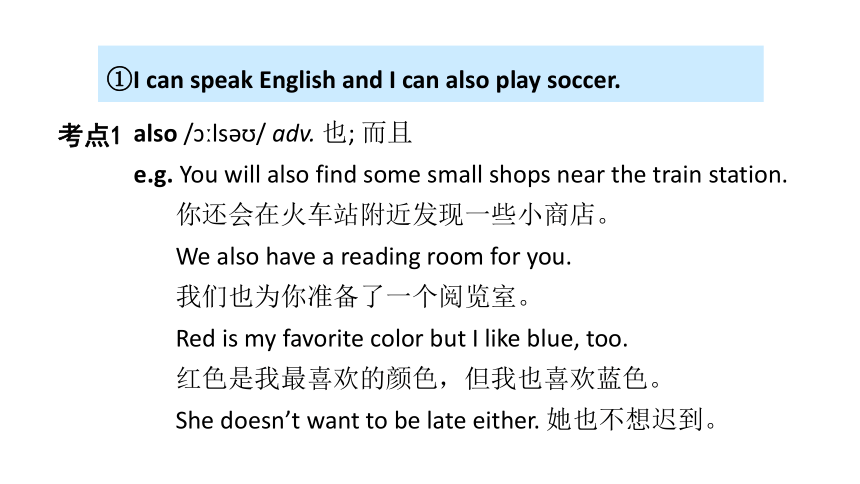
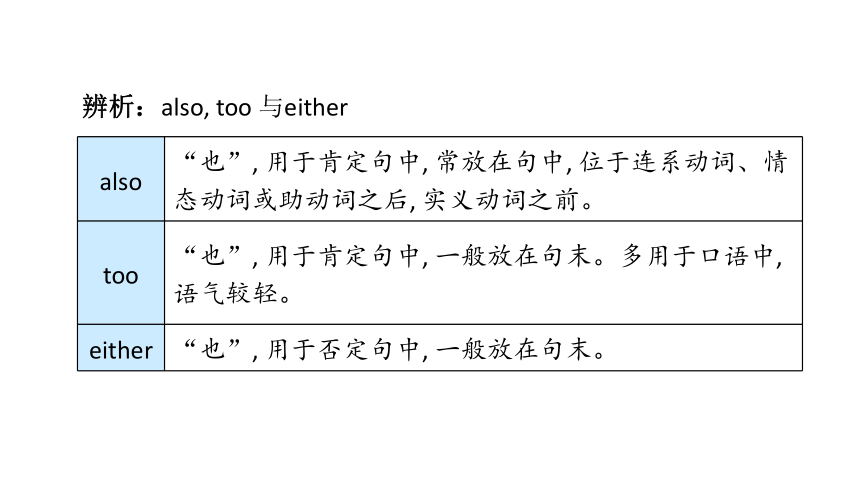
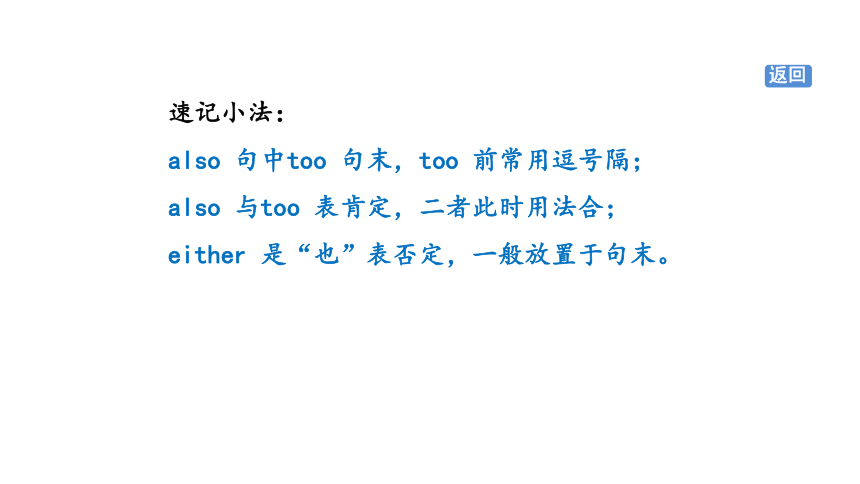

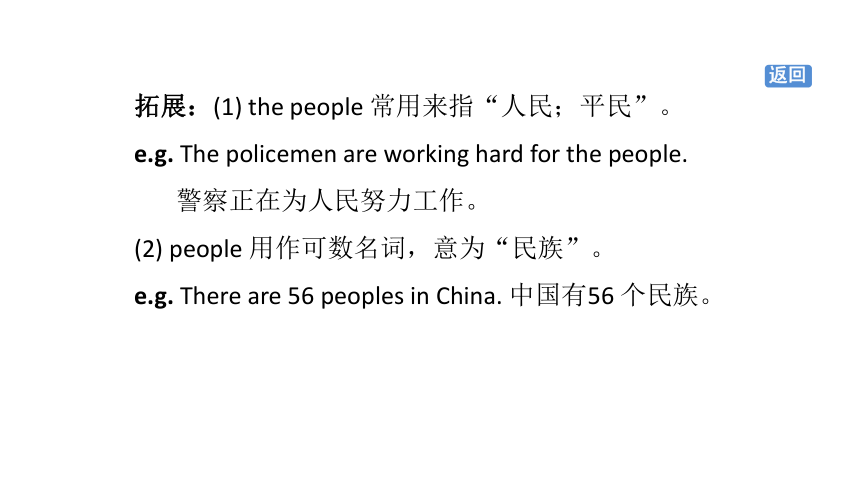
文档简介
(共49张PPT)
Period 4
Section B (2a-2c)
Unit 1 Can you play the guitar
What are your hobbies
2a Read the three descriptions about Peter, Alan and Ma Huan. Underline what they can do.
Hello, I'm Peter. I like to play basketball. I can speak English and I can also play soccer. ①
Hi, I'm Ma Huan. I can play ping- pong and chess. I like to talk and play games with people. ②
My name's Alan. I'm in the school music club. I can play the guitar and the piano. I can sing and dance, too.
2b Read the ads. Match the titles with the ads.
A. Help for Old People
B. Music Teacher Wanted
C. Help with Sports in English
( )
We need help at the old people‘s home. ③ Are you free in July Are you good with old people ④ Can you talk to them and play games with them They can tell you stories, and you can make friends. ⑤ It is interesting and fun! Please call us at 689-7729 today! ⑥
A
关爱老人是中华民族的传统美德。
作为青少年,我们要传承这一美德,尊老敬老。
( )
Are you busy after school ⑦ No Can you speak English Yes Then we need you to help with sports for English-speaking students. ⑧ It is relaxing and easy! Please come to the Students' Sports Center ⑨ Call Mr. Brown at 293-7742.
( )
Can you play the piano or the violin Do you have time on the weekend ⑩ The school needs help to teach music. It is not difficult! Please call Mrs. Miller at 555-3721.
B
C
2c Match each person in 2a with an ad in 2b. Write A, B and C.
Peter ________ Alan ________ Ma Huan ________
C
B
A
①I can speak English and I can also play soccer.
also / ls / adv. 也; 而且
e.g. You will also find some small shops near the train station.
你还会在火车站附近发现一些小商店。
We also have a reading room for you.
我们也为你准备了一个阅览室。
Red is my favorite color but I like blue, too.
红色是我最喜欢的颜色,但我也喜欢蓝色。
She doesn’t want to be late either. 她也不想迟到。
考点1
辨析:also, too 与either
also “也”, 用于肯定句中, 常放在句中, 位于连系动词、情态动词或助动词之后, 实义动词之前。
too “也”, 用于肯定句中, 一般放在句末。多用于口语中, 语气较轻。
either “也”, 用于否定句中, 一般放在句末。
速记小法:
also 句中too 句末,too 前常用逗号隔;
also 与too 表肯定,二者此时用法合;
either 是“也”表否定,一般放置于句末。
返回
②I like to talk and play games with people.
people /'pi pl/ n. 人;人们
people 是集合名词,表示复数意义,着重全体,其前可以用大于1 的基数词或many, a lot of 等修饰。people 作主语时谓语动词用复数。
e.g. About 200 people are watching the football match.
大约200 人正在观看足球比赛。
考点2
考向
表示“一个人”时,
要用a/one person。
拓展:(1) the people 常用来指“人民;平民”。
e.g. The policemen are working hard for the people.
警察正在为人民努力工作。
(2) people 用作可数名词,意为“民族”。
e.g. There are 56 peoples in China. 中国有56 个民族。
返回
③ We need help at the old people’s home.
home /h m/ n. 家;活动本部 adv. 到家;在家
e.g. His home is in a big city.
他的家在一个大城市里。
Jack likes to stay home.
杰克喜欢待在家。
考点3
作名词
作副词
辨析:home, family 与house
home 意为“家”, 主要指一个人出生或居住的地方, 也有“家乡、故乡”的意思, 它具有house 所没有的感彩。
family 意为“家庭、家庭成员”, 与居住的房子无关。
house 意为“房屋、住宅”, 一般指家人所居住的建筑物。
e.g. Home is a warm place for us.
对我们来说家是一个温暖的地方。
His family is very big.
他家是一个大家庭。
Jack’s family are having a trip in the mountains.
杰克一家人正在山里旅行。
There are many new houses in our village.
我们村子里有很多新房子。
家庭,单数
家庭成员,复数
一语辨异:
We have a big house. My family love and help each other. We are a happy family. Welcome to our home! 我们有一所大房子。我的家人互爱互助。我们是一个幸福的家庭。欢迎来我们家!
考题1:[枣庄] 我在家里练习英语,阅读书籍。
I practice English and read books _______ ________.
at home
返回
④ Are you good with old people
be good with... 善于应付……的; 对……有办法。
e.g. That man over there is good with words.
那边那个人很善于言谈。
考点4
His grandmother is good at using WeChat.
他的祖母擅长使用微信。
Swimming is good for our health.
游泳对我们的健康有益。
Little Tom is very lovely and he is always good to his dog.
小汤姆非常可爱, 他总是对他的狗很好。
擅长……
对……有益
对……友好
考题2:[贵港] Jim is a funny boy. He is good _______ telling jokes.
A. with B. at
C. for D. of
B
返回
⑤ They can tell you stories, and you can make friends.
make friends 结交朋友
表示“与某人交朋友”要用“make friends with sb.”。
e.g. The young man likes making friends.
这个年轻人喜欢交朋友。
Do you want to make friends with the girl
你想和那个女孩儿交朋友吗?
考点5
此短语中的friend 要用复数形式
考向
考题3:[重庆A 卷] 加入社团是一个很好的交友方式。
Joining a club is a good way to _________ _________.
make friends
make /me k/ v. 使成为; 制造
考点6
make 用作使役动词,意为“使成为”,后接复合宾语。
e.g. Your chocolate tastes good but it makes my teeth black!
你的巧克力味道好,但它让我的牙齿变黑!
They want to make Tom the leader of their team.
他们想让汤姆当他们团队的领导。
My mother makes me clean the room.
我妈妈让我打扫房间。
考向1
make 用作及物动词,意为“制造;做”。make sth. for sb. =make sb. sth.,意为“为某人制作某物”。
e.g. Can you make bread 你会做面包吗?
The cooks often make dumplings for us.
厨师们经常给我们包饺子。
考向2
make 作使役动词的常见用法:
① make sb./sth.+ 形容词 使某人/某物处于某种状态
② make sb.+ 名词 使某人成为……
③ make sb. do sth. 使某人做某事
make 构成的常见短语:make faces 做鬼脸
make money 赚钱 make progress 取得进步
make yourself at home 请自便
考题4:We’ll work together to make our dreams ___________ (come) true.
come
返回
⑥ Please call us at 689-7729 today!
call sb. at ... 拨打……和某人联系
e.g. If you have trouble, please call the police at 110.
如果你遇到麻烦,请拨打110 和警察联系。
Have you got time to call him
你有时间给他打电话吗?
考点7
call sb.
给某人打电话
at后面接电话号码
返回
⑦ Are you busy after school
busy /b zi/ adj. 忙碌的
e.g. The writer is busy writing his new book.
= The writer is busy with his new book.
这位作家忙于写他的新书。
Every time I tried to phone John, the line was busy.
每次我试图给约翰打电话的时候,电话都占线。
考点8
反义词为free。
busy 的常见用法:
① be busy doing sth.忙着做某事
② be busy with ... 忙于……,后接名词、代词等
③ be busy 在打电话中是指“占线”
考题6:[福建] The twin(双胞胎) brothers are busy ________ artworks from ocean waste.
A. making B. make C. to make
A
考题5:My grandparents are b (忙碌的) making zongzi for the Dragon Boat Festival.
返回
usy
⑧ Then we need you to help with sports for English-speaking students.
need /ni d/ v. 需要;有必要
考点9
need 作实义动词,有人称和数的变化。
e.g. The boy needs his father’s help.
这个男孩需要他爸爸的帮助。
I need to join a club. 我需要加入一个俱乐部。
My watch needs mending again.
我的手表需要再修理一下。
考向
表示“需要被修理”
拓展:need 用作情态动词, 没有人称、数和时态的变化, 多用于疑问句和否定句。
e.g. You needn’t say sorry to me. 你不必向我道歉。
Need I go there with you 我需要和你一起去那儿吗?
need 作实义动词的常见用法:
① need sth. 需要某物
② need(sb.)to do sth.需要( 某人) 做某事
③ need doing sth.……需要做 (含有被动意义,主语常为物)
速记小法:
need 用法总结
实义动词表“需要”,后接名词/代词/不定式/动词的-ing 形式;情态动词表“需要”,没有时态、人称、数变化,其后直接跟动词原形,多用于否定句和疑问句。
考题7:—Does he need ______ there at once
—No, he ______ leave so hurriedly(匆忙地) because he has enough time.
A. to go; doesn’t need B. go; needn’t
C. to go; needn’t D. go; doesn’t need
C
help v. 帮助
help 用作动词,常用短语help (sb.) with sth. 意为“在某方面帮助(某人)”,相当于“help (sb.) (to) do sth.”。
e.g. Can you help with the work
= Can you help (to) do the work
你能帮助做这项工作吗?
考点10
考向
拓展:help 还可用作不可数名词,意为“帮助”。
e.g. With the help of you, I learned to use the computer.
= With your help, I learned to use the computer.
在你的帮助下,我学会了用电脑。
You can ask me for help if you have a problem.
如果你有问题,可以向我求助。
help 作名词时的常见搭配:
① with the help of sb.= with sb.’s help
在某人的帮助下
② ask sb. for help
向某人寻求帮助
拓展:
① can’t help doing sth.忍不住做某事
② help oneself to ... 随便吃/喝……
考题8:[温州] Ann often helps me _______ math after school.
A. for B. with
C. on D. by
考题9:[温州] —Jack, I have no idea for the report.
—Me neither. Why don’t we ask the teacher for _______
A. help B. jokes
C. food D. tickets
B
A
返回
⑨ Please come to the Students’ Sports Center.
Students’ 学生们的
students’ 是复数名词的所有格。
e.g. students’ books 学生们的书
考点11
考向
表示人或有生命的事物的单数名 词一般在词尾加’s。 e. g. the boy’s aunt
这个男孩的姑姑
以-s 结尾的表示人或有生命的事 物的复数名词只在词尾加’。 e. g. the students’ bags 学生们的包
the ladies’ room 女厕所
不以-s结尾的复数名词,后加’s。 e. g. children’s toys
孩子们的玩具
几个名词表示各自的所有关系时,名词末尾均需加所有格;若表示共同拥有时,只在最后一个名词的后面加所有格。 e. g. Tom’s and Mary’s books
汤姆的书和玛丽的书
Tom and Mary’s book
汤姆和玛丽的书
拓展:名词所有格分为以下几种情况:
速记小法:
名词所有格变化规则口诀
名词所有格,表物是“谁的”;
若为生命词,“’s”后面搁;
复数词尾有s,仅仅需把所有格择;
并列名词后,各自、共有起干戈;
前者分别加,后者最后合。
考题10:[重庆A 卷] This year, the family went camping on _________ Day, June 1st.
A. Child B. Child’s
C. Children D. Children’s
D
返回
⑩ Do you have time on the weekend
have time 有时间;有空
其同义短语是be free。
e.g. Many parents don’t have time to stay with their children.
=Many parents have no time to stay with their children.
许多父母没有时间和他们的孩子待在一起。
考点12
考向
= Are you free on the weekend
have no time 没空
have (no) time to do sth.(没)有时间做某事
on the weekend(在) 周末
on the weekend(=on weekends) 为美式英语,英式英语中,则用at the weekend(=at weekends)。weekend 意为“周末”,通常指星期六和星期日两天,其对应词为weekday (工作日)。
考点13
考向
e.g. What do you do on the weekend/weekends
你在周末做什么?
The shop opens at 9:00 a.m. on weekdays, but at 10:30 a.m. on weekends.
这个商店在工作日上午9:00 开门,但在周末上午10:30 开门。
速记小法:
week(星期)+end(末)=weekend(周末)
在工作日
返回
The school needs help to teach music.
teach /ti t / v. 教; 讲授
e.g. Mr. Li teaches English in a middle school. He is a teacher.
李先生在一所中学教英语。他是一名老师。
考点14
特别提醒:在teach sb. sth.结构中,当sb. 是人称代词时,要用其宾格形式。
e.g. Mr. Smith teaches us English. 史密斯先生教我们英语。
teach (+ sb.)+ 学科,意为“教(某人)……学科”。
拓展:teach 的其他用法:
teach sb. sth. 教某人某事 e. g. The father is teaching his son music.
这位父亲正在教他儿子音乐。
teach sb. to do sth. 教某人做某事 e. g. Could you teach me to play basketball
你能教我打篮球吗?
teach oneself 自学(自己教自己) e. g. One may teach himself when he is free.
人可以在空闲时间自学。
teach sb. a lesson 给某人一个教训 e. g. You should teach him a lesson.
你应该给他一个教训。
考题11:[绥化] The teacher with curly hair teaches us _________ the guitar.
A. to play B. play C. playing
A
返回
本节课主要学习了关于彼得、艾伦、马欢的三段描述和“招聘音乐老师”等三则广告, 掌握了知识点also, make friends, call sb. at, help with, Students’ Sports Center, teach等的用法。
Period 4
Section B (2a-2c)
Unit 1 Can you play the guitar
What are your hobbies
2a Read the three descriptions about Peter, Alan and Ma Huan. Underline what they can do.
Hello, I'm Peter. I like to play basketball. I can speak English and I can also play soccer. ①
Hi, I'm Ma Huan. I can play ping- pong and chess. I like to talk and play games with people. ②
My name's Alan. I'm in the school music club. I can play the guitar and the piano. I can sing and dance, too.
2b Read the ads. Match the titles with the ads.
A. Help for Old People
B. Music Teacher Wanted
C. Help with Sports in English
( )
We need help at the old people‘s home. ③ Are you free in July Are you good with old people ④ Can you talk to them and play games with them They can tell you stories, and you can make friends. ⑤ It is interesting and fun! Please call us at 689-7729 today! ⑥
A
关爱老人是中华民族的传统美德。
作为青少年,我们要传承这一美德,尊老敬老。
( )
Are you busy after school ⑦ No Can you speak English Yes Then we need you to help with sports for English-speaking students. ⑧ It is relaxing and easy! Please come to the Students' Sports Center ⑨ Call Mr. Brown at 293-7742.
( )
Can you play the piano or the violin Do you have time on the weekend ⑩ The school needs help to teach music. It is not difficult! Please call Mrs. Miller at 555-3721.
B
C
2c Match each person in 2a with an ad in 2b. Write A, B and C.
Peter ________ Alan ________ Ma Huan ________
C
B
A
①I can speak English and I can also play soccer.
also / ls / adv. 也; 而且
e.g. You will also find some small shops near the train station.
你还会在火车站附近发现一些小商店。
We also have a reading room for you.
我们也为你准备了一个阅览室。
Red is my favorite color but I like blue, too.
红色是我最喜欢的颜色,但我也喜欢蓝色。
She doesn’t want to be late either. 她也不想迟到。
考点1
辨析:also, too 与either
also “也”, 用于肯定句中, 常放在句中, 位于连系动词、情态动词或助动词之后, 实义动词之前。
too “也”, 用于肯定句中, 一般放在句末。多用于口语中, 语气较轻。
either “也”, 用于否定句中, 一般放在句末。
速记小法:
also 句中too 句末,too 前常用逗号隔;
also 与too 表肯定,二者此时用法合;
either 是“也”表否定,一般放置于句末。
返回
②I like to talk and play games with people.
people /'pi pl/ n. 人;人们
people 是集合名词,表示复数意义,着重全体,其前可以用大于1 的基数词或many, a lot of 等修饰。people 作主语时谓语动词用复数。
e.g. About 200 people are watching the football match.
大约200 人正在观看足球比赛。
考点2
考向
表示“一个人”时,
要用a/one person。
拓展:(1) the people 常用来指“人民;平民”。
e.g. The policemen are working hard for the people.
警察正在为人民努力工作。
(2) people 用作可数名词,意为“民族”。
e.g. There are 56 peoples in China. 中国有56 个民族。
返回
③ We need help at the old people’s home.
home /h m/ n. 家;活动本部 adv. 到家;在家
e.g. His home is in a big city.
他的家在一个大城市里。
Jack likes to stay home.
杰克喜欢待在家。
考点3
作名词
作副词
辨析:home, family 与house
home 意为“家”, 主要指一个人出生或居住的地方, 也有“家乡、故乡”的意思, 它具有house 所没有的感彩。
family 意为“家庭、家庭成员”, 与居住的房子无关。
house 意为“房屋、住宅”, 一般指家人所居住的建筑物。
e.g. Home is a warm place for us.
对我们来说家是一个温暖的地方。
His family is very big.
他家是一个大家庭。
Jack’s family are having a trip in the mountains.
杰克一家人正在山里旅行。
There are many new houses in our village.
我们村子里有很多新房子。
家庭,单数
家庭成员,复数
一语辨异:
We have a big house. My family love and help each other. We are a happy family. Welcome to our home! 我们有一所大房子。我的家人互爱互助。我们是一个幸福的家庭。欢迎来我们家!
考题1:[枣庄] 我在家里练习英语,阅读书籍。
I practice English and read books _______ ________.
at home
返回
④ Are you good with old people
be good with... 善于应付……的; 对……有办法。
e.g. That man over there is good with words.
那边那个人很善于言谈。
考点4
His grandmother is good at using WeChat.
他的祖母擅长使用微信。
Swimming is good for our health.
游泳对我们的健康有益。
Little Tom is very lovely and he is always good to his dog.
小汤姆非常可爱, 他总是对他的狗很好。
擅长……
对……有益
对……友好
考题2:[贵港] Jim is a funny boy. He is good _______ telling jokes.
A. with B. at
C. for D. of
B
返回
⑤ They can tell you stories, and you can make friends.
make friends 结交朋友
表示“与某人交朋友”要用“make friends with sb.”。
e.g. The young man likes making friends.
这个年轻人喜欢交朋友。
Do you want to make friends with the girl
你想和那个女孩儿交朋友吗?
考点5
此短语中的friend 要用复数形式
考向
考题3:[重庆A 卷] 加入社团是一个很好的交友方式。
Joining a club is a good way to _________ _________.
make friends
make /me k/ v. 使成为; 制造
考点6
make 用作使役动词,意为“使成为”,后接复合宾语。
e.g. Your chocolate tastes good but it makes my teeth black!
你的巧克力味道好,但它让我的牙齿变黑!
They want to make Tom the leader of their team.
他们想让汤姆当他们团队的领导。
My mother makes me clean the room.
我妈妈让我打扫房间。
考向1
make 用作及物动词,意为“制造;做”。make sth. for sb. =make sb. sth.,意为“为某人制作某物”。
e.g. Can you make bread 你会做面包吗?
The cooks often make dumplings for us.
厨师们经常给我们包饺子。
考向2
make 作使役动词的常见用法:
① make sb./sth.+ 形容词 使某人/某物处于某种状态
② make sb.+ 名词 使某人成为……
③ make sb. do sth. 使某人做某事
make 构成的常见短语:make faces 做鬼脸
make money 赚钱 make progress 取得进步
make yourself at home 请自便
考题4:We’ll work together to make our dreams ___________ (come) true.
come
返回
⑥ Please call us at 689-7729 today!
call sb. at ... 拨打……和某人联系
e.g. If you have trouble, please call the police at 110.
如果你遇到麻烦,请拨打110 和警察联系。
Have you got time to call him
你有时间给他打电话吗?
考点7
call sb.
给某人打电话
at后面接电话号码
返回
⑦ Are you busy after school
busy /b zi/ adj. 忙碌的
e.g. The writer is busy writing his new book.
= The writer is busy with his new book.
这位作家忙于写他的新书。
Every time I tried to phone John, the line was busy.
每次我试图给约翰打电话的时候,电话都占线。
考点8
反义词为free。
busy 的常见用法:
① be busy doing sth.忙着做某事
② be busy with ... 忙于……,后接名词、代词等
③ be busy 在打电话中是指“占线”
考题6:[福建] The twin(双胞胎) brothers are busy ________ artworks from ocean waste.
A. making B. make C. to make
A
考题5:My grandparents are b (忙碌的) making zongzi for the Dragon Boat Festival.
返回
usy
⑧ Then we need you to help with sports for English-speaking students.
need /ni d/ v. 需要;有必要
考点9
need 作实义动词,有人称和数的变化。
e.g. The boy needs his father’s help.
这个男孩需要他爸爸的帮助。
I need to join a club. 我需要加入一个俱乐部。
My watch needs mending again.
我的手表需要再修理一下。
考向
表示“需要被修理”
拓展:need 用作情态动词, 没有人称、数和时态的变化, 多用于疑问句和否定句。
e.g. You needn’t say sorry to me. 你不必向我道歉。
Need I go there with you 我需要和你一起去那儿吗?
need 作实义动词的常见用法:
① need sth. 需要某物
② need(sb.)to do sth.需要( 某人) 做某事
③ need doing sth.……需要做 (含有被动意义,主语常为物)
速记小法:
need 用法总结
实义动词表“需要”,后接名词/代词/不定式/动词的-ing 形式;情态动词表“需要”,没有时态、人称、数变化,其后直接跟动词原形,多用于否定句和疑问句。
考题7:—Does he need ______ there at once
—No, he ______ leave so hurriedly(匆忙地) because he has enough time.
A. to go; doesn’t need B. go; needn’t
C. to go; needn’t D. go; doesn’t need
C
help v. 帮助
help 用作动词,常用短语help (sb.) with sth. 意为“在某方面帮助(某人)”,相当于“help (sb.) (to) do sth.”。
e.g. Can you help with the work
= Can you help (to) do the work
你能帮助做这项工作吗?
考点10
考向
拓展:help 还可用作不可数名词,意为“帮助”。
e.g. With the help of you, I learned to use the computer.
= With your help, I learned to use the computer.
在你的帮助下,我学会了用电脑。
You can ask me for help if you have a problem.
如果你有问题,可以向我求助。
help 作名词时的常见搭配:
① with the help of sb.= with sb.’s help
在某人的帮助下
② ask sb. for help
向某人寻求帮助
拓展:
① can’t help doing sth.忍不住做某事
② help oneself to ... 随便吃/喝……
考题8:[温州] Ann often helps me _______ math after school.
A. for B. with
C. on D. by
考题9:[温州] —Jack, I have no idea for the report.
—Me neither. Why don’t we ask the teacher for _______
A. help B. jokes
C. food D. tickets
B
A
返回
⑨ Please come to the Students’ Sports Center.
Students’ 学生们的
students’ 是复数名词的所有格。
e.g. students’ books 学生们的书
考点11
考向
表示人或有生命的事物的单数名 词一般在词尾加’s。 e. g. the boy’s aunt
这个男孩的姑姑
以-s 结尾的表示人或有生命的事 物的复数名词只在词尾加’。 e. g. the students’ bags 学生们的包
the ladies’ room 女厕所
不以-s结尾的复数名词,后加’s。 e. g. children’s toys
孩子们的玩具
几个名词表示各自的所有关系时,名词末尾均需加所有格;若表示共同拥有时,只在最后一个名词的后面加所有格。 e. g. Tom’s and Mary’s books
汤姆的书和玛丽的书
Tom and Mary’s book
汤姆和玛丽的书
拓展:名词所有格分为以下几种情况:
速记小法:
名词所有格变化规则口诀
名词所有格,表物是“谁的”;
若为生命词,“’s”后面搁;
复数词尾有s,仅仅需把所有格择;
并列名词后,各自、共有起干戈;
前者分别加,后者最后合。
考题10:[重庆A 卷] This year, the family went camping on _________ Day, June 1st.
A. Child B. Child’s
C. Children D. Children’s
D
返回
⑩ Do you have time on the weekend
have time 有时间;有空
其同义短语是be free。
e.g. Many parents don’t have time to stay with their children.
=Many parents have no time to stay with their children.
许多父母没有时间和他们的孩子待在一起。
考点12
考向
= Are you free on the weekend
have no time 没空
have (no) time to do sth.(没)有时间做某事
on the weekend(在) 周末
on the weekend(=on weekends) 为美式英语,英式英语中,则用at the weekend(=at weekends)。weekend 意为“周末”,通常指星期六和星期日两天,其对应词为weekday (工作日)。
考点13
考向
e.g. What do you do on the weekend/weekends
你在周末做什么?
The shop opens at 9:00 a.m. on weekdays, but at 10:30 a.m. on weekends.
这个商店在工作日上午9:00 开门,但在周末上午10:30 开门。
速记小法:
week(星期)+end(末)=weekend(周末)
在工作日
返回
The school needs help to teach music.
teach /ti t / v. 教; 讲授
e.g. Mr. Li teaches English in a middle school. He is a teacher.
李先生在一所中学教英语。他是一名老师。
考点14
特别提醒:在teach sb. sth.结构中,当sb. 是人称代词时,要用其宾格形式。
e.g. Mr. Smith teaches us English. 史密斯先生教我们英语。
teach (+ sb.)+ 学科,意为“教(某人)……学科”。
拓展:teach 的其他用法:
teach sb. sth. 教某人某事 e. g. The father is teaching his son music.
这位父亲正在教他儿子音乐。
teach sb. to do sth. 教某人做某事 e. g. Could you teach me to play basketball
你能教我打篮球吗?
teach oneself 自学(自己教自己) e. g. One may teach himself when he is free.
人可以在空闲时间自学。
teach sb. a lesson 给某人一个教训 e. g. You should teach him a lesson.
你应该给他一个教训。
考题11:[绥化] The teacher with curly hair teaches us _________ the guitar.
A. to play B. play C. playing
A
返回
本节课主要学习了关于彼得、艾伦、马欢的三段描述和“招聘音乐老师”等三则广告, 掌握了知识点also, make friends, call sb. at, help with, Students’ Sports Center, teach等的用法。
同课章节目录
- Unit 1 Can you play the guitar?
- Section A
- Section B
- Unit 2 What time do you go to school?
- Section A
- Section B
- Unit 3 How do you get to school?
- Section A
- Section B
- Unit 4 Don't eat in class.
- Section A
- Section B
- Unit 5 Why do you like pandas?
- Section A
- Section B
- Unit 6 I'm watching TV.
- Section A
- Section B
- Review of Units 1-6
- Unit 7 It's raining!
- Section A
- Section B
- Unit 8 Is there a post office near here?
- Section A
- Section B
- Unit 9 What does he look like?
- Section A
- Section B
- Unit 10 I'd like some noodles.
- Section A
- Section B
- Unit 11 How was your school trip?
- Section A
- Section B
- Unit 12 What did you do last weekend?
- Section A
- Section B
